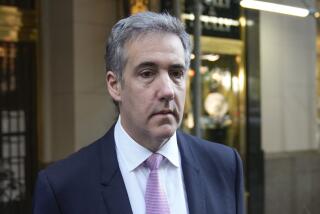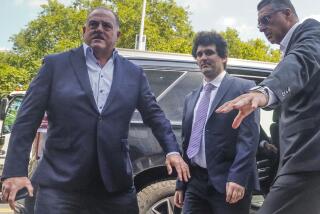Andersen Testimony Ends
- Share via
HOUSTON — Lawyers for accounting firm Arthur Andersen rested their case Tuesday, setting the stage for crucial closing arguments today that trial observers believe could tip the balance in the case.
The two sides in the Andersen trial have essentially battled to a draw, making the summation a potential turning point, said veteran Houston litigator David Berg. With the basic facts not in dispute, Berg said closing arguments will be a last chance for the attorneys to give jurors the arguments they need to persuade others on the panel to their way of thinking.
“You have to arm your friends and disarm your enemies on that jury,” Berg said.
Each side is expected to take up to four hours to present their summation. Prosecutors plan to argue that Andersen, already on probation for previous audit failures, feared additional sanctions arising from Enron Corp.’s collapse and orchestrated a campaign to destroy potentially incriminating documents to impede a Securities and Exchange Commission investigation.
One of the government’s primary objectives, analysts say, should be to undermine Andersen’s contention that the document shredding that took place in October was an exercise in routine housekeeping.
For the defense, led by veteran Texas lawyer Rusty Hardin, the closing will be a final chance to argue that Andersen lacked the criminal intent required for a conviction, and that the Justice Department, by indicting the firm, unfairly tainted a company of more than 25,000 people--most of whom didn’t work on auditing Enron.
“In this case, if I were Rusty Hardin, I’d want to get very, very over the top,” Berg said. “I’d put the government on trial, say that what they’ve done is unconscionable.”
Several wild cards remain. One is the extent to which jurors may lean toward punishing Andersen for obstruction of justice because of its connection to Enron, whose collapse cost thousands of local jobs and billions of dollars in investment and retirement losses.
Another is how the panel will feel about Hardin, who has openly quarreled with what he considered pro-prosecution rulings by U.S. District Judge Melinda Harmon. Almost every major evidentiary ruling in the case has gone the government’s way.
Harmon also will instruct the panel on the law governing the case today. The statute under which Andersen is charged says it is a crime to “corruptly persuade” another person to destroy materials with the intent to “impair the object’s integrity or availability for use in an official proceeding.”
Under the prosecution theory, when Andersen in-house attorney Nancy Temple sent an e-mail Oct.12 referencing the firm’s document retention policy to a Houston partner, she intended it as a coded signal to begin shredding Enron-related documents. The policy calls for the retention of papers needed to back up an auditor’s conclusions and the disposal of drafts and other files deemed unnecessary.
Andersen’s lead Enron auditor, David Duncan, testified that the e-mail was part of what motivated him Oct. 23 to direct his team to comply with the policy.
Duncan, who has pleaded guilty to obstruction, said he knew his order would result in the destruction of documents and make them unavailable to the SEC.
Prosecutors say Duncan’s plea is all the government needs to prove that Andersen is guilty. The instructions said Duncan’s plea alone is not evidence.
Prosecutors also had made an unusual request to Harmon to let the jury consider three Andersen employees’ refusal to testify as evidence against the firm. But the judge rejected the request, with the two sides agreeing that she should instruct jurors that for reasons “with which you need not concern yourself,” the employees “were unavailable to testify” and that no conclusion should be drawn for or against either Andersen or the government.
Earlier Tuesday, prosecutors finished cross-examining Andersen’s last witness, senior partner John Riley, a former SEC official who testified Monday that he didn’t expect regulators to investigate Andersen until after the firm concluded Nov. 5 that Enron would have to restate its earnings from earlier fiscal quarters.
But in questioning Riley, Assistant U.S. Atty. Andrew Weissmann suggested that Riley, who worked at the SEC for 11 years, should have known--based on his personal experience with Andersen’s botched audits of Waste Management Inc. and Sunbeam Corp.--that the agency would be asking for Andersen files.
Harmon, wrapping up the proceedings for the day, told jurors to “bring your pajamas” because she plans to sequester the panel during deliberations.
More to Read
Inside the business of entertainment
The Wide Shot brings you news, analysis and insights on everything from streaming wars to production — and what it all means for the future.
You may occasionally receive promotional content from the Los Angeles Times.










